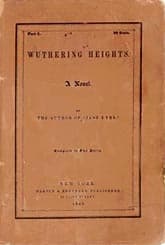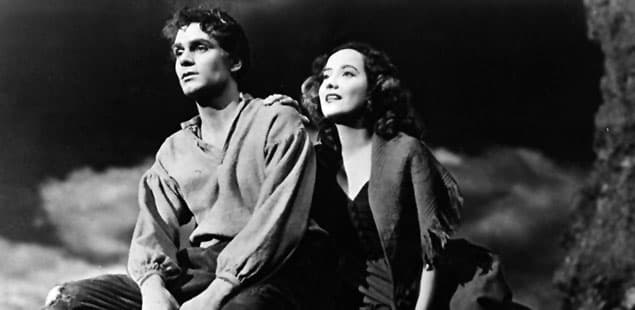Wuthering Heights
Critique • Quotes • Text • At the movies
 First U.S. edition, 1848
First U.S. edition, 1848First publication
1847 in England
Literary form
Novel
Genres
Literary
Writing language
English
Author's country
England
Length
Approx. 116,000 words

Laurence Olivier and Merle Oberon are tragic lovers in 1939'sWuthering Heights.
Straightening out a literary classic
Wuthering Heights (1939): Film, 103 minutes; director William Wyler; writers Charles MacArthur, Ben Hecht, John Huston; featuring Laurence Olivier, Merle Oberon, David Niven, Geraldine Fitzgerald
Here's the pattern.
In the early days of Hollywood, classic novels are adapted for grandiose entertainments that drastically compress or change the stories, characters and themes.
Years later they are redone in grittier styles, purporting to be more faithful to the authors' original visions. Often these unctuously carry the original author's name in the film title: Mary Shelley's Frankenstein, Bram Stoker's Dracula, William Shakespeare's Merchant of Venice—as if to say, "Forget what came before, here's the authentic work as the author intended", although the boast is seldom fully justified.
In much more recent times you may also get modernized or updated versions of the stories, sometimes even skipping any overt references to the original work—like Jane Austen plots placed in London businesses or American high schools.
The transfer of Emily Brontë's wildly passionate novel Wuthering Heights to large and small screens follows this pattern to some degree.
But the classic British novel presents would-be adapters a hurdle that sends them off in different directions. Emily Brontë's storyline is hopelessly convoluted, with multiply nested narrators and a multiple-generation plot that turns in upon itself. How screenplay writers straighten out these complexities—or don't—determines to a large degree their success or failure.
The melodramatic heights
The first impulse, at least in Hollywood, was to get rid of the convolutions and a whole generation of Wuthering Heights characters.
The first black-and-white version of the beloved novel is considered one of the great films that came out in the incredible year of 1939—along with The Wizard of Oz, Gone with the Wind, Ninotchka, Mr. Smith Goes to Washington, Destry Rides Again, and Stagecoach. All of which are better than Wuthering Heights in my opinion, although the Brontë film held its own at the box office—and at the Academy Awards, with eight nominations and one win.
On the plus side, Wuthering Heights has the great Laurence Olivier as Heathcliff. A fine smoulderer he is too.
On the negative side, this adaptation cuts out most of the latter events of the novel. It never gets to the third generation of Earnshaws, Lintons and Heathcliffs because it climaxes (and re-climaxes) with the fateful ends of Catherine and Heathcliff, without any mention of offspring. Some might consider this another plus though, since the entanglement of the kids in the novel seems to just go over the same ground already covered in the Heathcliff-Cathy relationship.
But let's go back to the previous point. The great Laurence Olivier as Heathcliff may also be a problem. It's hard to imagine him growing from the dark-skinned gypsy boy he was supposed to be near the film's beginning. He is too clean and cultured to be continually scorned as the filthy stable boy.
He is more believable however as the sophisticated but cruel Heathcliff of the second half of the film.
And Merle Oberon—why does Heathcliff go for her Cathy? As a youngster, Cathy (played by a child actor) is vivacious, fresh, lovable. As an adult she's flighty, stuck up, and uninteresting. I don't see the romantic sparks between her and Olivier that others rhapsodize over—just a lot of melodramatic overacting. I just wish he'd give her up.
Scenes from 1939's romantic film of Wuthering Heights.
But he doesn't of course. The pagan connection between the two of them in the novel is just a lot of over-wrought emotionalism in the movie, culminating in the long, drawn-out death scene. It's topped however with Hollywood's biggest cliché for giving any tragic story a happy ending: the spirits of the two leads walk off together into the hereafter.
Something else that bothers me is that Thrushcross Grange (belonging to David Niven in a hapless role as the emotionally cuckolded Linton) looks from the inside like every other mansion in 1930s Hollywood movies: cavernous, white rooms with Romanesque pillars, sweeping stairways and twenty-foot ceilings—way too spacious to fit in a house of English provincial gentry in the 1700s. Rather a minor point, admittedly, but another indication of how Hollywood sugar-coated everything. The whole film is just too bright and airy for Brontë's dark and cramped tale.
The biggest difference readers may notice however may be in how the story is told. The novel's narration from multiple perspectives is reduced in the flick to one long story told by the housekeeper in chronological order. A probably necessary and admirable measure to make it accessible for the general public in 1939, but it does reduce the mystery that comes with Brontë's fragmented unfolding of the tale.
— Eric

